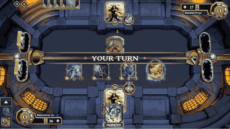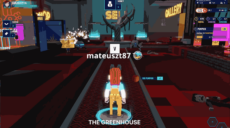AI cryptocurrencies combine blockchain with artificial intelligence to power decentralized machine learning networks, GPU computin...
Based on our research, the best crypto games top pick for 2026 is Off the Grid. Players earn rewards by playing matches and completing in-game missions.
Two strong alternatives: Axie Infinity for its RPG mechanics and established economy, and Pudgy Penguins for its recognizable NFT brand and casual, easy-to-play game.
Crypto gaming now combines engaging gameplay, real ownership, and balanced rewards. Our methodology takes these factors into account, scoring each title based on user experience, earning design, innovation, and security.
Top Crypto Game to Play in February 2026 – Editor’s Pick
Our pick for the best crypto game to play in February 2026 is Off the Grid (GUN ). It is a fast-paced shooter where players earn rewards just by playing the game. There is no mining hardware involved, progress comes from matches, missions, and in-game activity.
Best Crypto & Blockchain Games Reviews
We’ve thoroughly tested and analyzed the top crypto games to bring you detailed reviews that go beyond surface-level descriptions.
1. Off the Grid – Cyberpunk Battle Royale with NFT
Off the Grid is an AAA battle royale and extraction shooter in early access from the developers behind the popular game Warface. The game is free to play but incorporates optional paid Web3 elements that do not affect core gameplay. Players open HEX loot boxes and trade in-game NFTs on a marketplace, creating a blockchain-based economy.

Off the Grid is an AAA game on the same level as PUBG, Fortnite, and others. Source: YouTube
Key Facts:
- Ideal For: Fans of shooters and battle royale games, beginners in Web3
- How To Earn: Trading NFTs, opening HEX loot boxes
- Our Rating: ⭐8.3/10
| Genre | Battle Royale / Extraction Shooter |
| Developer | Gunzilla Games |
| Platform | PC (Steam, Epic Games, GeForce Now), PlayStation 5, Xbox Series X/S |
| Blockchain | Avalanche (GUNZ L1 subnet) |
| Token | GUN |
| Entry Cost | Free to play, <$50 for Web3 options |
| Status | Early access |
2. Axie Infinity – The Pioneering Crypto RPG Inspired by Pokémon
Axie Infinity is one of the earliest crypto games, launched in 2018. The RPG project is inspired by Pokémon games and lets players raise digital pets called Axies, resembling axolotls, to use across different game modes. Players can also trade virtual land and other in-game assets in the form of NFTs. In November 2021, a virtual land plot was sold for a record $2.3 million.

A team consists of three Axies, each with different designs and abilities. Source: YouTube
Key Facts:
- Ideal For: Beginners, RPG, and Pokémon fans
- How To Earn: Selling and trading NFTs
- Our Rating: ⭐7.9/10
| Genre | RPG |
| Developer | Sky Mavis |
| Platform | PC, iOS, Android |
| Blockchain | Ronin, Ethereum |
| Token | AXS, SLP |
| Entry Cost | Free to play, <$50 for basic Axies |
| Status | Live |
3. Pudgy Penguins – Iconic NFT Brand with Gaming Expansion
Pudgy Penguins is a popular NFT collection with $746 million in all-time trading volume, according to CryptoSlam. Over time, the collection has evolved into a full-fledged Web3 brand with its own ecosystem that includes games. Pudgy Party is a free-to-play mobile elimination game similar to the well-known Fall Guys, featuring Pudgy Penguins characters. It does not offer earning mechanics and is primarily designed to promote the brand. Pudgy World is an announced but not yet launched metaverse featuring Pudgy Penguins characters.

Pudgy Penguins characters differ from one another through their colorful outfits. Source: Pudgy Party
Key Facts:
- Ideal For: Casual players, NFT collectors
- How To Earn: Trading NFTs
- Our Rating: ⭐6.5/10
| Genre | Battle royale, party game |
| Developer | Mythical Games |
| Platform | iOS, Android |
| Blockchain | Ethereum |
| Token | PENGU |
| Entry Cost | Free to play |
| Status | Live |
4. Gods Unchained – Strategic Trading Card Game
Gods Unchained is a classic collectible card game (CCG) similar to Magic: The Gathering and Hearthstone, but built on the blockchain. Players own digital collectible cards as NFTs, giving them true ownership rather than the illusion of ownership found in other CCGs. Gods Unchained also rewards players with GODS tokens for in-game activity, which can be used to craft cards, stake, or sell.

The design and gameplay of Gods Unchained are standard for the CCG. Source: YouTube
Key Facts:
- Ideal For: Collectible card game players
- How To Earn: Trading NFT cards, activity, and ranked rewards in GODS
- Our Rating: ⭐6.9/10
| Genre | Collectible card game |
| Developer | Immutable |
| Platform | PC, iOS, Android |
| Blockchain | Immutable X (Ethereum L2) |
| Token | GODS |
| Entry Cost | Free to play |
| Status | Live |
5. Big Time – Fast-Paced Action RPG with Optional NFTs
Big Time is an online action RPG that mixes dungeon runs, combat, and time-travel themes. The game is free to play and feels like a classic hack-and-slash RPG, not a crypto game first. Players fight enemies, clear dungeons, and collect loot, while blockchain elements stay optional in the background. Big Time focuses on skill and teamwork rather than grinding for tokens. NFTs are mostly cosmetic and do not give gameplay advantages.

Big Time has a familiar RPG-style interface, with abilities at the bottom and quests on the right. Source: YouTube
Key Facts:
- Ideal For: Action RPG fans, casual players
- How To Earn: Trading cosmetic NFTs
- Our Rating: ⭐6.8/10
| Genre | Action RPG |
| Developer | Big Time Studios |
| Platform | PC |
| Blockchain | Ethereum |
| Token | BIGTIME |
| Entry Cost | Free to play |
| Status | Live |
6. The Sandbox – Ecosystem of Games to Earn Crypto
The Sandbox is a metaverse known for major partnerships with Atari and Snoop Dogg. The blockchain gaming platform focuses on user-generated content, offering tools like VoxEdit and Game Maker that allow participants to create 3D assets, games, and interactive experiences without coding skills. Players can also purchase virtual land as NFTs, develop it with custom content, and monetize their projects through the marketplace.

In The Sandbox, anyone can find a game they enjoy or create their own. Source: YouTube
Key Facts:
- Ideal For: Casual players, in-game builders
- How To Earn: Monetizing your own projects through the marketplace
- Our Rating: ⭐6.7/10
| Genre | Metaverse |
| Developer | Pixowl (subsidiary of Animoca Brands) |
| Platform | PC, iOS, Android |
| Blockchain | Ethereum |
| Token | SAND |
| Entry Cost | Free to play, <$50 to earn |
| Status | Live |
7. EVE Frontier – Hardcore Survival MMO in the EVE Universe
EVE Frontier is an upcoming survival MMO set in the EVE Online universe, developed by CCP Games. Unlike the classic EVE Online, EVE Frontier focuses on small-scale survival, crafting, and emergent player-driven gameplay rather than large-scale fleet warfare. Blockchain technology in the game is used to enable ownership of in-game assets.

EVE Frontier stands out for its complex interface and high entry barrier. Source: YouTube
Key Facts:
- Ideal For: Experienced gamers, EVE Online fans
- How To Earn: Crafting, selling, and trading NFTs
- Our Rating: ⭐6.1/10
| Genre | Survival MMO, sandbox |
| Developer | CCP Games |
| Platform | PC |
| Blockchain | Ethereum |
| Token | Not disclosed |
| Entry Cost | Free to play, $50-200 to earn |
| Status | In development |
8. Shrapnel – Competitive Extraction FPS with Player-Created Content
Shrapnel is a competitive AAA extraction shooter similar to Escape from Tarkov, developed by industry veterans who previously worked on Halo, Call of Duty, and Star Wars. The game focuses on user-generated content, allowing players to create maps, modes, and cosmetic items that can be tokenized and sold.

Shrapnel is a modern shooter with a familiar interface and intuitive gameplay. Source: YouTube
Key Facts:
- Ideal For: FPS fans, competitive players, creators
- How To Earn: Trading NFTs, creating and selling user-generated content
- Our Rating: ⭐7.2/10
| Genre | Extraction shooter, FPS |
| Developer | Neon Machine |
| Platform | PC |
| Blockchain | Avalanche |
| Token | SHRAP |
| Entry Cost | Free to play, $50-200 to earn |
| Status | Early access |
9. My Neighbor Alice – Cozy Multiplayer Builder on Blockchain
My Neighbor Alice is an attempt to create a fully on-chain, friendly multiplayer world that values creativity and collaboration over competition. The game is similar to the popular Animal Crossing and also focuses on avatar and island customization. Players can create and sell NFT items, own land NFTs, and use the ALICE token for governance and staking.

The world of My Neighbor Alice is filled with scenic locations that help players relax. Source: YouTube
Key Facts:
- Ideal For: Casual players, creative builders, Animal Crossing fans
- How To Earn: Trading NFTs, ecosystem rewards
- Our Rating: ⭐6.4/10
| Genre | Multiplayer builder, social MMO |
| Developer | Antler Interactive |
| Platform | PC |
| Blockchain | Chromia |
| Token | ALICE |
| Entry Cost | Free to play, <$50 to earn |
| Status | Live |
10. Decentraland – Open Metaverse with Virtual Land Economy
Decentraland is one of the earliest blockchain-based metaverses, built around virtual land ownership and user-generated content. The platform allows players to explore the world, socialize, host and attend events, and create interactive spaces on land parcels represented as NFTs. Today, Decentraland functions more as a hub for virtual events and exhibitions than as a traditional game.

Decentraland’s graphics feel outdated by 2025 standards, but it has its own vibe. Source: YouTube
Key Facts:
- Ideal For: Virtual land investors, Web3 social users
- How To Earn: Renting and selling LAND, hosting events, NFT trading
- Our Rating: ⭐6.1/10
| Genre | Metaverse, virtual world |
| Developer | Decentraland Foundation |
| Platform | PC, Browser |
| Blockchain | Ethereum |
| Token | MANA |
| Entry Cost | $50-200 |
| Status | Live |
How to Get Started with Crypto Gaming
To start playing crypto games, you need a crypto wallet, a basic understanding of how crypto works in games, and a clear idea of what you are actually spending money on.
Step 1: Set Up a Crypto Wallet
Most crypto games require a wallet to play. It stores your tokens, NFTs, and game items. Use a trusted wallet like MetaMask or Best Wallet, install it only from the official site, and save your recovery phrase offline. Never share it.
Step 2: Learn the Basics You Need
You do not need to be a crypto expert. You just need to know how to connect your wallet to a game, approve transactions, claim rewards, and pay small network fees. On the gaming side, understand how the game works: what actions earn rewards and what actions cost money.
Step 3: Know What You Are Paying For
Spending money in a crypto game usually means buying low cap crypto tokens, NFTs, or access to better earning features. These assets can lose value fast and may only work inside one game. Start small and only spend what you are ready to lose.
Crypto gaming mixes fun and risk. Take it slow, test one game first, and learn how it works before putting in real money.
Security Tips for First-Time Players
Crypto games are fun, but mistakes can cost real money, so basic security matters from day one.
- Never share your seed phrase or private keys. No game or support team will ever ask for them.
- Use trusted wallets and official links only. Always double-check URLs before connecting your wallet.
- Keep gaming and savings separate. Use one wallet for games and another for long-term storage.
- Start with small test transactions. This helps you learn without risking real value.
- Stick to well-known games with active communities. Avoid projects that promise fast or guaranteed profits.
- Check fees and balances before confirming. Gas fees and approvals can add up quickly.
- Protect your accounts with strong passwords. Turn on two-factor authentication when available.
Crypto gaming rewards patience and caution. Take your time, test things slowly, and treat every transaction like real money, because it is. Be careful with 1000x crypto stories, because scam links often hide behind that hype.
Comparing the Top Crypto Games to Play in 2026
Here’s our comparison of the top crypto games currently dominating the blockchain gaming space.
| Game | Genre | Entry Cost | Earning Potential | Get Tokens |
| Off the Grid | Battle Royale / Extraction Shooter | <$50 for Web3 options | Medium – skill-based NFT trading | Visit Binance |
| Axie Infinity | RPG | <$50 for basic Axies | Medium – PvP, NFT economy | Visit Bybit |
| Pudgy Penguins | Battle royale, party game | Free to play | Low – brand-driven NFT value | Visit Coinbase |
| Gods Unchained | Collectible card game | Free to play | Medium – skill-based card trading | Visit OKX |
| Big Time | Action RPG | Free to play | Medium – cosmetic NFT trading | Visit Bitunix |
| The Sandbox | Metaverse, sandbox | <$50 to earn | Medium – creator monetization | Visit MEXC |
| EVE Frontier | Survival MMO, sandbox | $50-200 to earn | Low-Medium – player economy, unclear | – |
| Shrapnel | Extraction shooter, FPS | $50-200 to earn | Medium – creator-led NFT sales | Visit CoinEx |
| My Neighbor Alice | Multiplayer builder, social MMO | <$50 to earn | Low – casual NFT economy | Visit BingX |
| Decentraland | Metaverse, virtual world | $50-200 | Low-Medium – land and events | Visit BloFin |
This list covers the most established and promising blockchain games, each offering unique gameplay mechanics and earning opportunities.
Extra Crypto Games to Explore
Here are a few additional crypto games worth exploring that didn’t make our main list but stand out for their unique concepts or active communities.
1. Pixels – Social Farming RPG on Ronin
Pixels is a casual social RPG that blends farming, quests, and light MMO mechanics with on-chain assets. Built on the Ronin blockchain, the game focuses on daily progression, crafting, and social interaction rather than competitive gameplay.
Pixels’ pixel-style 2D design is reminiscent of the popular game Stardew Valley. Source: YouTube
Why Not Listed: Limited depth, casual-first economy
Better Choice: Axie Infinity – deeper gameplay and PvP
2. Star Atlas – Ambitious Space MMO on Solana
Star Atlas is a sci-fi MMO set in a vast space universe, combining exploration, strategy, and player-owned assets. Built on Solana, the project promises a large-scale on-chain economy tied to ships, land, and resources, but much of the gameplay vision remains in development.

Star Atlas stands out with a minimalist interface that is uncommon for this genre. Source: YouTube
Why Not Listed: Early-stage gameplay, unmet roadmap
Better Choice: EVE Frontier – more tangible MMO systems
3. Illuvium – AAA Auto-Battler and RPG Hybrid
Illuvium is a visually polished RPG and auto-battler featuring NFT creatures called Illuvials. Built on Ethereum and Immutable X, it focuses on PvE exploration and PvP combat, positioning itself as one of the most ambitious AAA crypto games to date.

Illuvium’s modern gameplay and high-quality visuals set it apart from other best crypto games. Source: YouTube
Why Not Listed: High complexity, niche appeal
Better Choice: Axie Infinity – simpler onboarding, proven economy
4. STEPN – Move-to-Earn Fitness App
STEPN is a move-to-earn app that rewards users for walking or running using NFT sneakers. Built on Solana, it popularized the fitness-plus-crypto model but is more of a lifestyle app than a traditional game.

STEPN features NFT sneakers in a wide variety of designs to suit different tastes. Source: YouTube
Why Not Listed: Limited gameplay depth
Better Choice: Decentraland – clearer monetization
How We Rated the Best Crypto Games – Our Methodology
We rate crypto games using Coinspeaker methodology, focusing on how games actually work for real players. Instead of marketing claims, we test gameplay, review reward systems, and check usability and safety. This approach helps explain clearly why some games rank higher than others.
Gameplay – 30%
The game must be fun first. We check how it feels to play, how active the gameplay is, and whether it stays interesting after the first few sessions. Games that repeat the same actions with no depth or challenge score lower. We also look at pacing, variety, and how much control the player has. If a game feels more like a task than entertainment, it loses points, even if rewards look good.
Accessibility – 20%
This part focuses on how easy it is to start and keep playing. We test wallet connection, sign-up flow, menus, and basic controls. Games that require too many steps or outside tools score lower. We also consider new players with no crypto background. If a game explains things clearly and works smoothly on common devices, it ranks higher.
Rewards – 20%
Here, we review how players earn and whether the system makes sense long-term. This includes token rewards, NFTs, staking, and in-game economies. We avoid projects that rely only on hype or short-term payouts. We also check if rewards depend on skill, time, or luck, and whether players can realistically earn without large upfront spending.
Security – 15%
Safety is critical in crypto games. We check if the team is public, whether smart contracts are audited, and how transparent the project is about risks and updates. Games with unclear ownership, missing audits, or weak communication lose points, even if gameplay looks solid.
Originality – 15%
This measures whether the game does something new or meaningful with blockchain. We reward projects that use crypto for real ownership, gameplay mechanics, or player control. Simple clones or games that add tokens without a purpose score lower. Innovation does not need to be complex, but it must be real.
New Crypto Games Releases to Watch in 2026
The crypto gaming pipeline is packed with innovative titles that could reshape the industry. These upcoming releases combine lessons learned from earlier games with new methods, technology, and fresh gameplay concepts.
| Game | Genre | Status | Why It’s Promising |
| EVE Frontier | Space Survival MMO | Beta | Player-owned economy with dual-token model (EVE + LUX) |
| Kiraverse | Shooter / Battle Royale | Presale | NFT-based customization powered by Unreal Engine 5 |
| Wreck League | Robot Battler | Announced | Animoca-backed mech NFTs with Web3 esports focus |
| Big Time | Action RPG | Open Beta | High-quality graphics with collectible NFT rewards |
We recommend keeping a close eye on these games, as they are significant investments from experienced teams and major studios. For upcoming token launches and presales, an ICO calendar can help you track important dates and opportunities.
What Are Crypto Games?
Crypto games, also known as blockchain games or Web3 games, are video games that use cryptocurrency and blockchain technology in their core mechanics. Unlike traditional games, where you might earn points or achievements that stay within the game, crypto games let you earn, own, and trade real digital assets.
The key difference lies in true ownership. In traditional games, that rare sword or character skin belongs to the game company: they can delete it, change it, or take it away. In crypto games, your items exist as NFTs (non-fungible tokens) on the blockchain. It means that you actually own them and can sell, trade, or use them however you want.
Most crypto games also feature play-to-earn (P2E) mechanics, where your gaming skills and time investment can generate real cryptocurrency rewards. This transforms gaming from pure entertainment into a potential income source.
Another important aspect of crypto gaming is transparency. It is built into crypto games through blockchain technology. All transactions, reward distributions, and game economics are visible on-chain, creating trust between players and developers.
Many crypto games also offer governance features, allowing players to vote on game changes and participate in the development process through Decentralized Autonomous Organizations (DAO).
Types of Crypto Games Explained
Crypto gaming includes diverse game types, each of which offers unique experiences and earning opportunities. If you understand these categories, you will be able to find games that match your interests and goals.
Play-to-Earn (P2E) Games
These games reward players with cryptocurrency or NFTs for completing tasks, winning battles, or achieving milestones. P2E games range from simple mobile clickers to complex strategy games requiring significant skill development.
NFT Collection Games
Focus on acquiring, breeding, or battling unique digital creatures or items represented as NFTs. Players can trade these assets on marketplaces for real money. CryptoKitties pioneered this category, while games like Axie Infinity perfected the breeding mechanics.
Metaverse Games
Create persistent virtual worlds where players can buy land, build experiences, and socialize. The Sandbox and Decentraland lead this category, allowing users to create and monetize their own content within shared virtual spaces.
DeFi Gaming
Combine gaming with decentralized finance features like staking, liquidity provision, and yield farming. These games gamify financial activities, making DeFi more accessible and engaging for mainstream users.
Casino and Gambling
Blockchain-based versions of traditional casino games often feature provably fair mechanics and cryptocurrency payments. These include everything from poker and blackjack to unique crypto-native games like crash and dice.
Idle and Clicker Games
Simple games requiring minimal active participation are often played through Telegram bots or basic web interfaces. Popular on mobile platforms, these games let players earn crypto through passive gameplay.
Strategy and MMO Games
Complex games require long-term planning and collaboration with other players. Star Atlas and Guild of Guardians represent this category’s potential for deep, engaging gameplay combined with blockchain features.
Free Crypto Games vs Paid – Which Is Better?
Free crypto games are better for beginners and low-risk play, while paid crypto games make more sense for players who want higher rewards and accept more risk.
Free – Easy Way to Start
Free crypto games are the simplest way to enter blockchain gaming. You don’t need to spend money up front, which makes them a good choice for beginners or casual players. Games like Gods Unchained and Alien Worlds let you start playing and earning without buying NFTs or tokens first.
The downside is that rewards are usually smaller. Progress can feel slow, and competition for free rewards is often high. Free games work best if your goal is to learn how crypto games function or earn small amounts over time.
Paid – Higher Risk, Higher Potential
Paid crypto games require an upfront investment. This can be NFTs, in-game tokens, or land. In return, they often offer deeper gameplay, better visuals, and higher earning potential. Examples include Axie Infinity, where stronger teams perform better, and The Sandbox, where owning land unlocks monetization options.
But if the game loses players or token prices drop, assets can lose value. Paid games are better suited for players who understand the space and are comfortable taking financial risk.
Key Differences
Below is a simple comparison of free and paid crypto games based on the most important criteria.
| Game | Play Experience | Graphics Level | Skills Needed | Reward Potential | Key Risks |
| Off the Grid | Battle royale shooter | High | Aim, tactics, reflexes | Medium | NFT demand, early access |
| Axie Infinity | RPG battles | Medium | Strategy, time investment | Medium | Token volatility |
| Pudgy Penguins | Casual party matches | Medium | Reflexes | Low | No direct earnings |
| Gods Unchained | Competitive card battles | Medium | Strategy, deck building | Medium | Card price swings |
| Big Time | Action RPG dungeon runs | Medium | Combat skills, teamwork | Low | Cosmetic NFT demand |
| The Sandbox | Open-world building and creation | Medium | Creativity, time | Medium | High land costs |
| EVE Frontier | Hardcore survival MMO | High | Complex skills | Low-Medium | High learning curve |
| Shrapnel | Competitive extraction FPS | High | FPS skills, teamwork | Medium | Still early access |
| My Neighbor Alice | Cozy building and farming | Medium | Creativity, time | Low | Limited demand |
| Decentraland | Social metaverse | Low to Medium | Creativity, time | Low-Medium | Weak player activity |
If you are new to crypto games, free titles are the safest way to start. They help you understand wallets, NFTs, and rewards without risking money. Once you know what kind of gameplay you enjoy, paid games can offer better earning opportunities, but only if you are ready for market risk.
Many experienced players use both approaches: free games for steady, low-risk activity and paid games for higher potential returns.
Mobile vs PC Crypto Games – What’s Better for You?
Mobile crypto games are best if you want something simple and easy to play. They work well on your phone, don’t need powerful hardware, and are good for short sessions during the day. Games like Pudgy Penguins and Pixels focus on casual play, light mechanics, and low effort. Earnings are usually smaller, but getting started is fast and cheap.
PC crypto games are better if you want deeper gameplay and higher rewards. They take more time and skill, but often feel closer to real video games. Titles like Axie Infinity, Gods Unchained, Off the Grid, and Shrapnel offer more complex systems, better visuals, and stronger earning paths tied to skill, NFTs, or trading.
In short, mobile games fit casual players who want easy access, while PC games suit players who are ready to invest time and aim for higher returns.
| Criteria | Mobile | PC |
| Accessibility | Play anywhere, anytime | Requires dedicated setup |
| Graphics Quality | Basic to moderate | High-end, immersive |
| Earning Potential | Low to moderate | Moderate to high |
| Time Investment | Casual, flexible | Often requires longer sessions |
| Entry Barrier | low | Moderate to high |
Pick mobile if you want casual gaming that fits into your daily routine, prefer simple mechanics, or are new to the crypto gaming industry. Choose PC if you’re serious about maximizing earnings, enjoy complex gameplay, or want the best possible experience.
Many successful crypto gamers use both platforms: mobile for passive earning and daily tasks, and PC for serious gameplay and trading activities.
Why Play Crypto Games? Benefits & Risks
Crypto games let you play and earn at the same time, but they are not risk free. Before jumping in, it helps to understand what you gain and what you might lose.
Pros
- Earn crypto while playing games
- Own in-game items as NFTs
- Trade assets for real value
- Open and transparent game economies
- Early access to new game ideas
Cons
- Token prices change very fast
- Scams and fake games exist
- Wallet mistakes can cost money
- Rules and taxes may change
- Some games feel repetitive
Crypto games can be fun and rewarding if you choose carefully. Play games you enjoy, start small, and never risk money you can’t afford to lose.
Conclusion – the Best Crypto Game Depends on How You Like to Play
Crypto games are video games that use blockchain to give players real ownership of items and rewards. Instead of points that stay inside the game, you earn tokens or NFTs that you can trade or sell. This is what makes crypto gaming different and new: your time in the game can turn into real value, not just entertainment.
Two games stand out right now. Axie Infinity turns crypto gaming into a simple strategy and RPG experience where you build a team, upgrade your Axies, and earn by playing smart, not by nonstop grinding or fast clicking. Off the Grid is the opposite style. It plays like a full AAA shooter with smooth combat and strong visuals, while crypto features stay optional in the background through NFTs.
Crypto games always come with risk. Token prices move fast, rewards can change, and not every project lasts. Start small, play games you actually enjoy, and never treat crypto gaming as guaranteed income.
FAQ
What are crypto games?
How do crypto games work?
How do you earn crypto from games?
What are the best free crypto games in 2026?
Can you make real money from crypto games?
What’s the difference between free and paid crypto games?
Do you need a crypto wallet to play crypto games?
Are crypto games safe and legit?
Are crypto games worth playing in 2026?
How do blockchain games make money?
References
- Layer 1 Blockchain – CoinMarketCap
- DAOs – Britannica
- Blockchain Technology – Investopedia
- Gas Fees – Coinbase
Coinspeaker in Numbers
Monthly Users
Articles & Guides
Research Hours
Authors
If you have been following VFX token, you probably noticed the same question popping up everywhere: when does Vortex FX token actu...
The VFX token is tied directly to Vortex FX, a regulated forex broker that’s already executing trades and publishing live trading ...
 Fact-Checked by:
Fact-Checked by:
 25 mins
25 mins
Otar Topuria
Crypto Editor, 38 postsI’m a crypto writer and analyst at Coinspeaker with over three years of experience covering fintech and the rapidly evolving cryptocurrency landscape. My work focuses on market movements, investment trends, and the narratives driving them, helping readers what is happening in the markets and why. In addition to Coinspeaker, my insights and analyses have been featured in other leading crypto and fintech publications, where I’ve built a reputation as a thoughtful and reliable voice in the industry.
My mission is to demystify the crypto markets and help readers navigate the noise, highlighting the stories and trends that truly matter. Before specializing in crypto, I worked in the IT sector, writing technical content on software development, digital innovation, and emerging technologies. That made me something of an expert in breaking down complex systems and explaining them in a clear, accessible way, skills I now find very useful when it comes to unpacking the intricate world of blockchain and digital assets.
I hold a Master’s degree in Comparative Literature, which sharpened my ability to analyze patterns, draw connections across disciplines, and communicate nuanced ideas. I’m particularly passionate about early-stage project discovery and crypto trading, areas where innovation meets opportunity. I enjoy exploring how new protocols, tokens, and DeFi projects aim to disrupt traditional systems, while also evaluating their potential risks and rewards. By combining market analysis with forward-looking research, I strive to provide readers with content that is both informative and actionable.